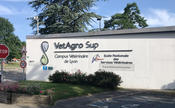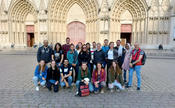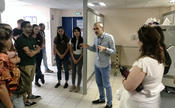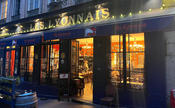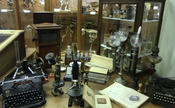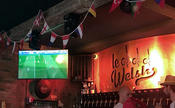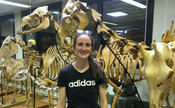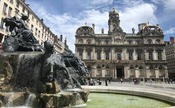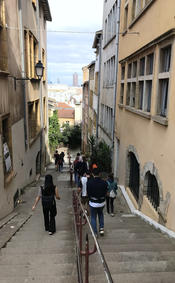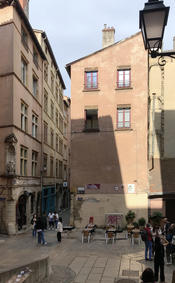French-German Summer School 2024 in Lyon
Die diesjährige French-German Summer School wurde vom 1. bis zum 5. Juli 2024 von der veterinärmedizinischen Universität in Lyon, Frankreich ausgerichtet (VetAgro Sup, Campus vétérinaire de Lyon). Wie in jedem Jahr kamen Doktoranden, PhD-Studenten und Post-Docs der veterinärmedizinischen Fakultäten aus Frankreich, Deutschland, Belgien und der Schweiz zusammen
News from Aug 09, 2024
A total of 20 participants from various disciplines spent a week together to focus on this year's topic "Clinical trials: from animals to humans and vice-versa". The social program was organized by Philippe Berny (Professor of Pharmacology and Toxicology at VetAgro Sup) and consisted of lectures, seminars, visits and evening activities in Lyon. The following is an overview of the individual days in Lyon.
- Day 1: The first day was all about getting to know the other participants and gaining an insight into the respective research areas. To this end, everyone presented their scientific research area with the most important results and a scientific exchange took place. The topics covered by the individual participants were wide-ranging and included in-vitro and in-vivo studies on various animal species. This was followed by a guided tour of the Veterinary Medicine campus in Marcy l'étoile with insights into the various clinics (equine, small animal and cattle clinics) and institutes. The day was rounded off with a visit and guided tour of the "Musée des sciences biologiques Dr Mérieux" for biosciences, which showed the history of microbiology and the importance of the fight against infectious diseases. In 1761, the world's first school of Veterinary Medicine was founded in Lyon by Claude Bourgelat. Marcel Mérieux set up his first laboratories in Marcy l'étoile in 1917 and over time this site became increasingly important as a global exporter of serums, vaccines and diagnostic tests.
- Day 2: The second day focused on the topic of sepsis. In a lecture by Prof. V. Louzier on "One Health: Contribution of animals to the fight against sepsis", the importance of sepsis models in preclinical research (for both veterinary and human medicine) was highlighted. This was followed by a lecture on "Perfusion monitoring in sepsis" by Dr. M. Kim and Dr. M. Magnin, in which the importance of evaluating tissue perfusion and microcirculation during sepsis in a clinical context was presented. In a seminar on "Critical reading of clinical trials", participants were given useful tools on what to look out for when writing publications. This was followed by a presentation by Dr. T. Cachon on "Animal models for human surgery", in which an overview of various osteoarthritis models was given. In the evening, there was a guided tour of the old town of Vieux Lyon (World Heritage Site) with a visit to the Basilique Notre-Dame de Fourvière, Chapelle Saint Thomas - Sainte Marie and Cathédrale Saint-Jean-Baptiste de Lyon. From the Esplanade de Fourvière there was a good view over various parts of Lyon, the two rivers Rhône and Saône.
- Day 3: The third day focused on dermatitis and oncology. Prof. D. Pin lectured on "The dog as a model for human genodermatoses", highlighting similarities between the canine and human genome and giving an overview of skin diseases caused by genetic mutations. This was followed by a presentation by Dr. M. Mosca on "Atopic dermatitis: human-dog comparative pathology", in which the pathophysiology of atopic dermatitis in humans and dogs was described and a canine atopic dermatitis model was presented. Dr. C. Escriou then spoke about strokes in dogs ("Towards a better characterization of spontaneous canine cerebrovascular accidents (CVA): a prospective pilot study"), highlighting the utility of multimodal MRI imaging for the evaluation of peracute neurological signs caused by cerebrovascular accidents (CVA) and the benefits for human medical research. The afternoon was devoted to oncology, with Prof. F. Ponce speaking on "Comparative oncology" and Prof. P. Berny on "Preclinical and clinical studies in veterinary oncology - a link to human oncology". It became clear that the investigation of spontaneous tumor models can be of benefit to both veterinary and human medicine.
- Day 4: On the fourth day, the topic "Placebo effect in animals: myth or reality?" was discussed. Under the direction of Prof. J.-F. Gueyffier and Prof. C. Prouillac, a workshopon placebo in clinical research in animalswas held, in which the participants were asked to develop their own protocols for clinical trials in which a conventional drug was to be tested against a placebo. This was followed by a guided tour of the cell culture laboratories of the Institute of Pharmacology and Toxicology at VetAgro Sup, where new drugs are produced and clinical trials are carried out. This was followed by a seminar on "Regulatory, practical considerations in the design of clinical trials" by Dr. S. Charaoui, in which the study design of a clinical trial was discussed with regard to specific questions, as well as a statistics lecture on "Equivalence Tests in Clinical Research". In the evening, there was a dinner in Vieux Lyon at the restaurant "Bouchon Les Lyonnais" with typical Lyon cuisine. Filming for the movie "Charles de Gaulle" was taking place next to the restaurant on the square of the Cathédrale Saint-Jean.
- Day 5: On the last day of the Summer School, the legal basis and ethical aspects of clinical research in Veterinary Medicine were presented and discussed by the participants in a lecture ("Regulatory ethical aspect of veterinary clinical trials - Example of VetAgroSup: Which research for which context?") by Dr. S. Vidal using the example of VetAgro Sup. This was followed by a visit to the "Musée d'Histoire de l'Enseignement Vétérinaire de Lyon", where various veterinary medicine specimens of veterinary anatomy and instruments from the historical collection could be viewed. Afterwards there was free time and further city excursions were possible. In the evening, we watched the European Championship quarter-final between Germany and Spain, in which Germany lost but France managed to beat Portugal and you could feel the excitement in front of the screens all over Lyon
All in all, it was an interesting week and a great time together in Lyon, both professionally and personally, with insights into different areas of research and discussions of different perspectives from the "One Health" aspect. It became clear that (pre-)clinical models are necessary in order to (better) understand the mechanisms of various diseases and that these can be of benefit to both veterinary and human medicine. The timing of the trip could not have been more exciting: Both the parliamentary elections in France and the Tour de France were taking place, and the 2024 Olympic Games were also virtually just around the corner.
I would like to thank Prof. Philippe Berny and the VetAgro Sup in Lyon for organizing this year's Summer School as well as the School of Veterinary Medicine at the FU Berlin for the opportunity to attend the Summer School. The next French-German Summer School in 2025 will probably take place in Giessen. I can recommend participation to anyone (whether they have just started their doctoral thesis or are a post-doc) who wants to develop their scientific skills, broaden their horizons in terms of Veterinary Medicine research, make new contacts and get to know a (new) city.
